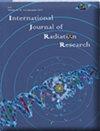Do auto-planning intensity modulated radiotherapy treatment plans for central lung cancer have improved quality over manual plans?
IF 0.4
4区 医学
Q4 RADIOLOGY, NUCLEAR MEDICINE & MEDICAL IMAGING
引用次数: 0
Abstract
Background : To investigate the performance of Auto - Planning intensity modulated radiation therapy (IMRT) plans for patients with central lung cancer and to determine whether Auto - Planning improves the quality of IMRT plans. Materials and Methods : Thirty patients treated with IMRT for central lung cancer were replanned with the Pinnacle 3 Auto - Planning module. The dose distribution at the target, organ at risk (OAR) sparing, dose falloff in the five rings outside of target, monitor units (MUs), planning time, and dosimetric verification in terms of the γ passing rate were evaluated. A Wilcoxon signed - rank test was performed to assess differences between groups (p<0.05). Results : The target homogeneity in the Auto - Planning were significantly better than that in the manual plans, the target conformity in both groups were similar. The Auto - Planning plans yielded lower V 5 , V 10 , V 13 , V 20 , V 30 , V 40 values, mean lung dose of total lung (p<0.01), and D max of spinal cord (p<0.01) and V 30 of heart (p<0.01). No significant difference was found for the V 40 of the heart (p=0.203). The Auto - Planning module reduced the D mean , D 2 and D 5 values in all rings outside of PTV. The planning time was 52.5% shorter for Auto - Planning plans than for manual plans (p<0.01), and 4.4% additional MUs were required with Auto - Planning. No difference was observed for the γ passing rate. Conclusion : Auto - Planning for central lung cancer could improve homogeneity of target volumes, significantly delivery lower dose to OARs and steeper dose falloff outside of tumors while reducing the planning time.中枢性肺癌的自动计划调强放疗治疗方案是否比人工计划质量更高?
背景:探讨Auto - Planning调强放射治疗(IMRT)方案对中心性肺癌患者的疗效,并确定Auto - Planning是否能提高IMRT方案的质量。材料与方法:采用Pinnacle 3自动计划模块对30例中枢性肺癌行IMRT治疗的患者进行重新计划。评估了靶处的剂量分布、危及器官(OAR)的保留、靶外五环的剂量衰减、监测单位(MUs)、计划时间以及根据γ及格率进行的剂量学验证。采用Wilcoxon符号秩检验评估组间差异(p<0.05)。结果:自动计划组的目标均匀性明显优于手工计划组,两组的目标一致性相似。Auto - Planning组的v5、v10、v13、v20、v30、v40、全肺平均肺剂量降低(p<0.01),脊髓dmax降低(p<0.01),心脏v30降低(p<0.01)。两组心脏v40无显著性差异(p=0.203)。Auto Planning模块减少了PTV以外所有环的D均值、d2和d2值。自动计划的计划时间比手动计划短52.5% (p<0.01),自动计划需要额外4.4%的MUs。γ通过率无差异。结论:中心性肺癌的自动计划治疗可改善靶体积的均匀性,显著降低靶腔内剂量,减少肿瘤外剂量衰减,缩短计划时间。
本文章由计算机程序翻译,如有差异,请以英文原文为准。
求助全文
约1分钟内获得全文
求助全文
来源期刊

International Journal of Radiation Research
RADIOLOGY, NUCLEAR MEDICINE & MEDICAL IMAGING-
CiteScore
1.10
自引率
33.30%
发文量
42
期刊介绍:
International Journal of Radiation Research (IJRR) publishes original scientific research and clinical investigations related to radiation oncology, radiation biology, and Medical and health physics. The clinical studies submitted for publication include experimental studies of combined modality treatment, especially chemoradiotherapy approaches, and relevant innovations in hyperthermia, brachytherapy, high LET irradiation, nuclear medicine, dosimetry, tumor imaging, radiation treatment planning, radiosensitizers, and radioprotectors. All manuscripts must pass stringent peer-review and only papers that are rated of high scientific quality are accepted.
 求助内容:
求助内容: 应助结果提醒方式:
应助结果提醒方式:


